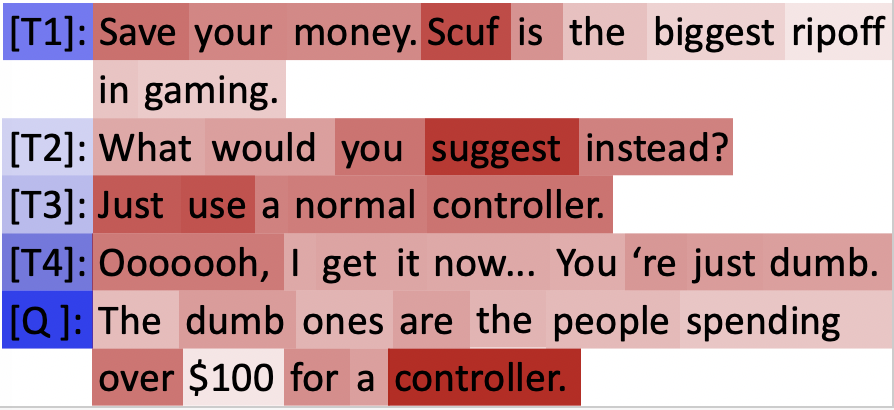Exploring the Role of Argument Structure in Online Debate Persuasion
Jialu Li, Esin Durmus, Claire Cardie
Sentiment Analysis, Stylistic Analysis, and Argument Mining Short Paper

You can open the pre-recorded video in a separate window.
Abstract:
Online debate forums provide users a platform to express their opinions on controversial topics while being exposed to opinions from diverse set of viewpoints. Existing work in Natural Language Processing (NLP) has shown that linguistic features extracted from the debate text and features encoding the characteristics of the audience are both critical in persuasion studies. In this paper, we aim to further investigate the role of discourse structure of the arguments from online debates in their persuasiveness. In particular, we use the factor graph model to obtain features for the argument structure of debates from an online debating platform and incorporate these features to an LSTM-based model to predict the debater that makes the most convincing arguments. We find that incorporating argument structure features play an essential role in achieving the best predictive performance in assessing the persuasiveness of the arguments on online debates.
NOTE: Video may display a random order of authors.
Correct author list is at the top of this page.
Connected Papers in EMNLP2020
Similar Papers
Continuity of Topic, Interaction, and Query: Learning to Quote in Online Conversations
Lingzhi Wang, Jing Li, Xingshan Zeng, Haisong Zhang, Kam-Fai Wong,

Extracting Implicitly Asserted Propositions in Argumentation
Yohan Jo, Jacky Visser, Chris Reed, Eduard Hovy,

Discourse Self-Attention for Discourse Element Identification in Argumentative Student Essays
Wei Song, Ziyao Song, Ruiji Fu, Lizhen Liu, Miaomiao Cheng, Ting Liu,

Quantitative argument summarization and beyond: Cross-domain key point analysis
Roy Bar-Haim, Yoav Kantor, Lilach Eden, Roni Friedman, Dan Lahav, Noam Slonim,
